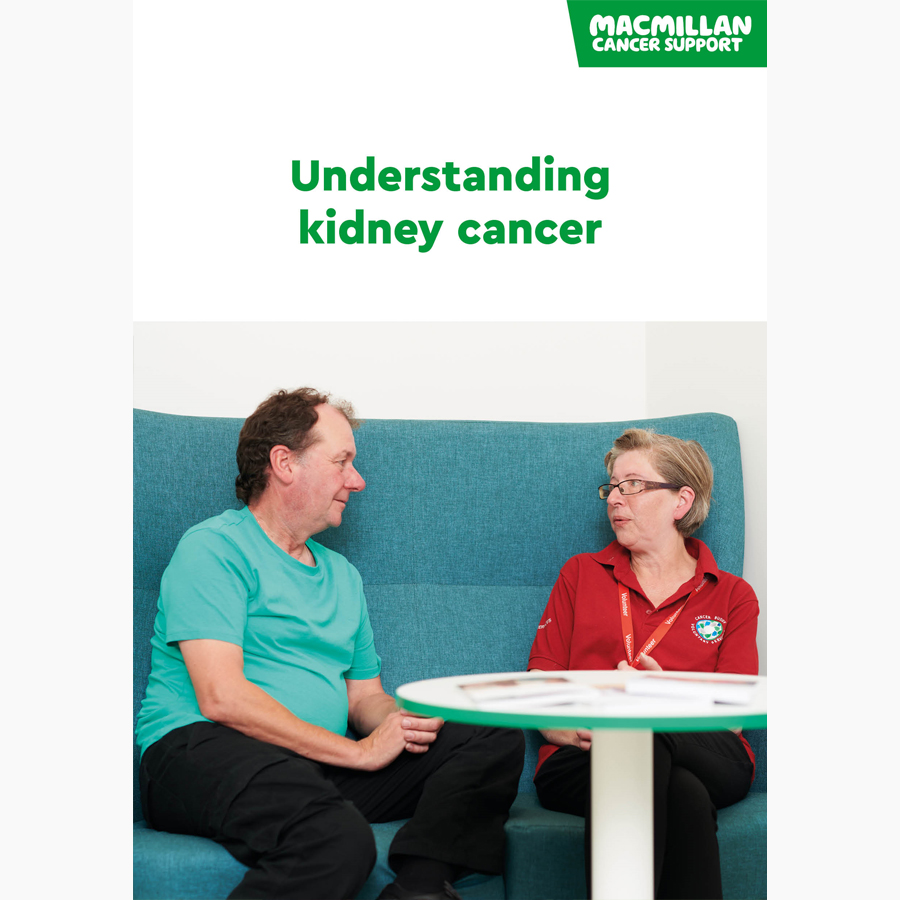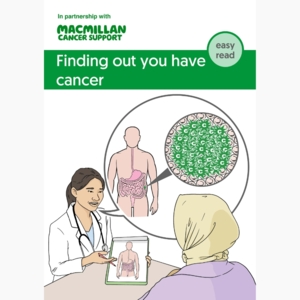What is kidney cancer?
Kidney cancer is a disease where abnormal cells develop and grow in 1 of the kidneys, forming a tumour. The kidneys are part of the urinary system. They filter waste from the blood and make urine.
Each year, over 13,000 people in the UK are diagnosed with kidney cancer. Most people have 2 kidneys. Cancer usually only affects 1.
This information is about the most common type of kidney cancer called renal cell cancer (RCC). If you have a rarer type, some of this information may still be helpful. But you should check with your cancer team.
Renal cell cancer (RCC)
About 8 out of 10 kidney cancers (80%) are renal cell cancers (RCCs). RCCs start in the main outer area of the kidney called the renal cortex.
The main types of RCC are:
- clear cell RCC – this is the most common type
- papillary RCC
- chromophobe RCC.
Upper urinary tract urothelial cancer (UTUC)
Upper urinary tract urothelial cancer (UTUC) is a type of cancer that sometimes affects the area of the kidney called the renal pelvis. It is also called transitional cell carcinoma.
UTUC develops and is treated differently to other types of kidney cancer. We have separate information about upper urinary tract urothelial cancer (UTUC).
Rarer renal cell cancers
Very rare types of renal cell cancer include:
- Renal medullary cancer (RMC) – a fast-growing cancer linked to a blood condition called sickle cell disease.
- Collecting duct cancer (CDC) – a cancer with features of both RCC and UTUC.
These types may be treated differently to other types of RCC. Your doctor can give you more information about RMC or CDC.
Occasionally, other cancers such as lymphoma or sarcoma are found in the kidney. These are not types of kidney cancer and may be treated quite differently.
Related pages
Booklets and resources
Symptoms of kidney cancer
A small kidney tumour does not always cause symptoms. But the most common kidney cancer symptom is blood in the urine (pee).
Blood in your urine is not always a sign of kidney cancer. It can be caused by other conditions. Always tell your GP if you have any symptoms or changes so they can check.
Related pages
Causes of kidney cancer
Doctors do not know the exact causes of kidney cancer. But there are risk factors that can increase your chance of developing it.
Find out more in our information about the causes and risk factors of kidney cancer.
Kidney cancer diagnosis
Kidney cancer is sometimes diagnosed during a scan for another reason. But if you have symptoms, start by seeing your GP. They will examine you. They may test your urine (pee) and blood to check:
- your general health
- how well your kidneys are working.
If needed they will refer you to the hospital to see a specialist doctor called a urologist. You will have an urgent referral if your test results or symptoms suggest you may have kidney cancer. This means you should get an appointment as soon as possible.
If you have blood in your urine, you may be referred to a haematuria clinic. Haematuria means blood in urine. The clinic can often do tests on the same day as your clinic appointment.
At the hospital
The urologist or a specialist nurse will examine you and arrange any tests that you need. This may include some of the following tests.
-
Blood tests
Blood tests check:
- how well your kidneys and liver are working
- the number of blood cells in your blood - this is called a blood count.
-
Ultrasound scan
An ultrasound scan can look for changes in the shape of the kidneys. It can show whether a lump is a cyst or a more solid tumour. It can also show the position of a cancer and its size.
If doctors also want to look at the bladder, you will need to have a full bladder for the scan. The hospital will give you instructions for this.
-
Kidney CT scan
If doctors see a possible kidney cancer while doing a scan for another reason, they may request a CT scan to look at the kidneys. Your doctor or nurse may call this a triple-phase CT scan.
-
CT urogram
A CT urogram is a type of CT scan that checks the kidneys, ureters and bladder. You may have this scan if you have blood in your urine.
-
Flexible cystoscopy
A flexible cystoscopy is a camera test that looks for changes inside the bladder. You may have this test if you have blood in the urine (pee).
Sometimes tests for kidney cancer find a kidney cyst. Kidney cysts are fluid-filled lumps. They are common and usually harmless. Sometimes your doctor may recommend you have follow-up tests, scans or treatment.
Further tests
If tests show you are likely to have kidney cancer, your doctor may want to do some of the following tests. These tests give more information about the cancer. This helps you and your doctor choose the best treatment for you.
-
A biopsy is when a sample of tissue is taken from the body and tested for cancer cells. Usually, the sample is collected from the area of the kidney affected by cancer. But if doctors think that the kidney cancer has spread to a different part of the body, the sample may be taken from there.
During a biopsy, the doctor injects some local anaesthetic into the skin to numb the area around the kidney. They use an ultrasound scan or a CT scan to guide them to the area they want to take the biopsy from. They use the needle to take a small sample of tissue. This sample is sent to the laboratory for testing.
You may need to stay in hospital for a few hours, or overnight, after a biopsy.
-
CT scan
You may have a CT scan of your chest, tummy (abdomen) and pelvis. This is to see whether the cancer has spread outside of the kidney to other parts of your body.
-
MRI scan
An MRI scan is sometimes done to see whether a kidney cancer has spread to other parts of the body, such as the bones or brain. This type of scan uses magnetism to build up a detailed picture of areas of the body.
Waiting for test results can be a difficult time. We have more information that can help.
Related pages
Staging and grading of kidney cancer
The results of your tests give your cancer team information about:
- the stage of cancer – this describes its size and whether it has spread
- the grade of cancer – this gives an idea of how quickly the cancer might grow and spread.
Knowing the stage and grade helps your doctors plan the best treatment for you.
Kidney cancer treatment
A team of specialists will meet to discuss the best possible treatment for you. This is called a multidisciplinary team (MDT).
Your doctor or cancer specialist or nurse will explain the different treatments and their side effects. They will also talk to you about things to consider when making treatment decisions. They need your permission (consent) before you have any treatment.
The following treatments are used for kidney cancer. Your treatment plan will depend on several factors. Find out how these are used to treat different stages of kidney cancer in our information about treatment for kidney cancer.
-
Surgery
Depending on the stage of the cancer and your general health, you may have surgery to remove part of your kidney or the whole kidney.
Rarely, surgery may be used to remove cancer that has spread to another part of the body (secondary cancer).
-
Tumour ablation
Tumour ablation may be used instead of surgery to treat small kidney cancers and in some other situations. This treatment destroys the cancer cells with very high or low temperatures.
-
Arterial embolisation
Arterial embolisation may be offered if surgery is not possible for you. It cannot cure the cancer by itself. But it can help control symptoms, such as pain or bleeding.
-
Monitoring
Monitoring a kidney cancer is a way of delaying treatment until it is needed. It is sometimes called active surveillance. The main advantage of monitoring is that you can avoid the risks or side effects of treatment.
-
Cancer drug treatment
Cancer drugs are used to treat kidney cancer in the following ways:
- If you have a genetic condition called von Hippel-Lindau disease (VHL), you may have a drug called belzutifan instead of surgery. This can control a small early kidney cancer.
- After surgery to remove a locally advanced kidney cancer, you may have a drug called pembrolizumab. This helps reduce the risk of the cancer coming back. Sometimes other drugs are used before or after surgery as part of a clinical trial.
- If you have advanced kidney cancer, your main treatment usually involves targeted therapy and immunotherapy drugs. You may have a combination of drugs or 1 drug on its own. You can find out more in our information about treatments for kidney cancer.
-
Radiotherapy
Radiotherapy is sometimes used to treat early kidney cancer if surgery is not an option. Usually a type called stereotactic ablative body radiotherapy (SABR), or stereotactic body radiation therapy (SBRT), is used.
Radiotherapy can also be given to control kidney cancer and treat any symptoms. This is called palliative treatment. Palliative radiotherapy may help control the cancer for longer when it is not possible to cure it. It might be used to treat:
You may have some treatments as part of a clinical trial.
Kidney cancer prognosis
Some people may try to find kidney cancer statistics to help them understand what might happen in their situation. This is called a prognosis. Doctors cannot predict exactly what will happen, but they may use some of the following statistics to help them make an estimate:
- Kidney cancer survival rates – this is the number of people who are alive after certain periods of time following a kidney cancer diagnosis. For example, 1, 2, 5 or 10 years later. It includes people who have no signs of cancer and also people who have kidney cancer that has come back.
- Kidney cancer recurrence or relapse rates – this is the number of people who have had treatment, but their kidney cancer has come back after certain periods of time.
- Kidney cancer mortality – this is the number of people who have died because of kidney cancer during a certain period of time.
You may find this information helpful, but not everyone wants or needs this information. Statistics can be complex and difficult to understand. They may help you understand more, but they cannot tell you what will definitely happen to you.
If you want information about kidney cancer prognosis, or you find information online that might apply to you, it is best to talk to your cancer doctor or specialist nurse. They can explain:
- which statistics apply to someone with your diagnosis
- what the information may mean to someone with your diagnosis
- how this may affect any treatment decisions you are thinking about.
After kidney cancer treatment
Follow-up after treatment for kidney cancer
You will have regular check-ups with your cancer doctor, urologist or nurse. They will explain how often and how long you will need to have these.
You might have regular tests or scans to check:
- how well your kidney or kidneys are working
- for any signs of the cancer coming back.
You can talk to your cancer doctor or specialist nurse about any problems or worries you have at your check-ups. If cancer comes back in the kidney but nowhere else, it may be possible to have further surgery to remove it.
Tell your doctor or specialist nurse as soon as possible if you have any problems or notice new symptoms between appointments.
We have more information about follow-up care after treatment.
Support after kidney cancer
People often have many different feelings when they finish kidney cancer treatment. You may feel relieved that treatment has finished, but worried about what will happen in the future.
Macmillan is here to support you. If you would like to talk, you can:
- Call the Macmillan Support Line on 0808 808 00 00.
- Chat to our specialists online.
- Visit our kidney cancer forum to talk to people who have been affected by kidney cancer, share your experience, and ask your questions.
Other organisations who offer information and support
Action Kidney Cancer – helps kidney cancer patients, families and friends join together and offer information, advice and friendship to each other.
Kidney Cancer UK – provides information, support and counselling for kidney cancer patients and their carers.
Kidney Care UK – practical, emotional and financial support for people with kidney conditions and their families.
Well-being and recovery
It can take time to recover after kidney cancer treatment. Some days you may feel better than others. A healthy lifestyle can:
- help speed up your recovery
- protect your remaining kidney or kidneys
- improve your well-being and long-term health.
Find out more in our information about recovery from treatment for kidney cancer.
It is important to know where to get support or information if you need it. People often need support even some time after kidney cancer treatment. But sometimes it is difficult to know who to ask for help. To find support:
- ask your GP or someone from your cancer team for advice about support in your area
- search Cancer Care Map to find cancer support services near you
- call us free on 0808 808 000 or talk to us online – our cancer information and support specialists can offer guidance and help you find what you need.
Our course (HOPE) helps people during and after cancer treatment. It is a free, interactive, group-based, self-management support course. It runs for 6 weeks, with each weekly session lasting 2.5 hours. To find out more about HOPE courses in your area, email ServiceOpsSupport@macmillan.org.uk
The HOPE programme is a free 6 session self-management course designed to help you develop techniques and strategies when living with or after cancer. Topics include goal setting, fatigue management, and wellbeing. You can sign up for the online HOPE programme. Or to find out more about face-to-face programmes in your area, email ServiceOpsSupport@macmillan.org.uk
About our information
This information has been written, revised and edited by Macmillan Cancer Support’s Cancer Information Development team. It has been reviewed by expert medical and health professionals and people living with cancer.
-
References
Below is a sample of the sources used in our kidney cancer information. If you would like more information about the sources we use, please contact us at informationproductionteam@macmillan.org.uk
Ljunberg B, Albiges L, Bedke J et al. European Association of Urology Guidelines on renal cell carcinoma. 2023. Available from https://uroweb.org/guidelines/renal-cell-carcinoma
Powles T, Albiges L, Bex A, et al. Renal cell carcinoma: ESMO Clinical Practice Guideline for diagnosis, treatment and follow-up. Ann Oncol. 2024 May 22. Available from: https://doi.org/10.1016/j.annonc.2024.05.537

Reviewer
Consultant Medical Oncologist in Renal and Skin Cancers
Royal Marsden Hospital, London
Date reviewed

Our cancer information meets the PIF TICK quality mark.
This means it is easy to use, up-to-date and based on the latest evidence. Learn more about how we produce our information.
The language we use
We want everyone affected by cancer to feel our information is written for them.
We want our information to be as clear as possible. To do this, we try to:
- use plain English
- explain medical words
- use short sentences
- use illustrations to explain text
- structure the information clearly
- make sure important points are clear.
We use gender-inclusive language and talk to our readers as ‘you’ so that everyone feels included. Where clinically necessary we use the terms ‘men’ and ‘women’ or ‘male’ and ‘female’. For example, we do so when talking about parts of the body or mentioning statistics or research about who is affected.
You can read more about how we produce our information here.






